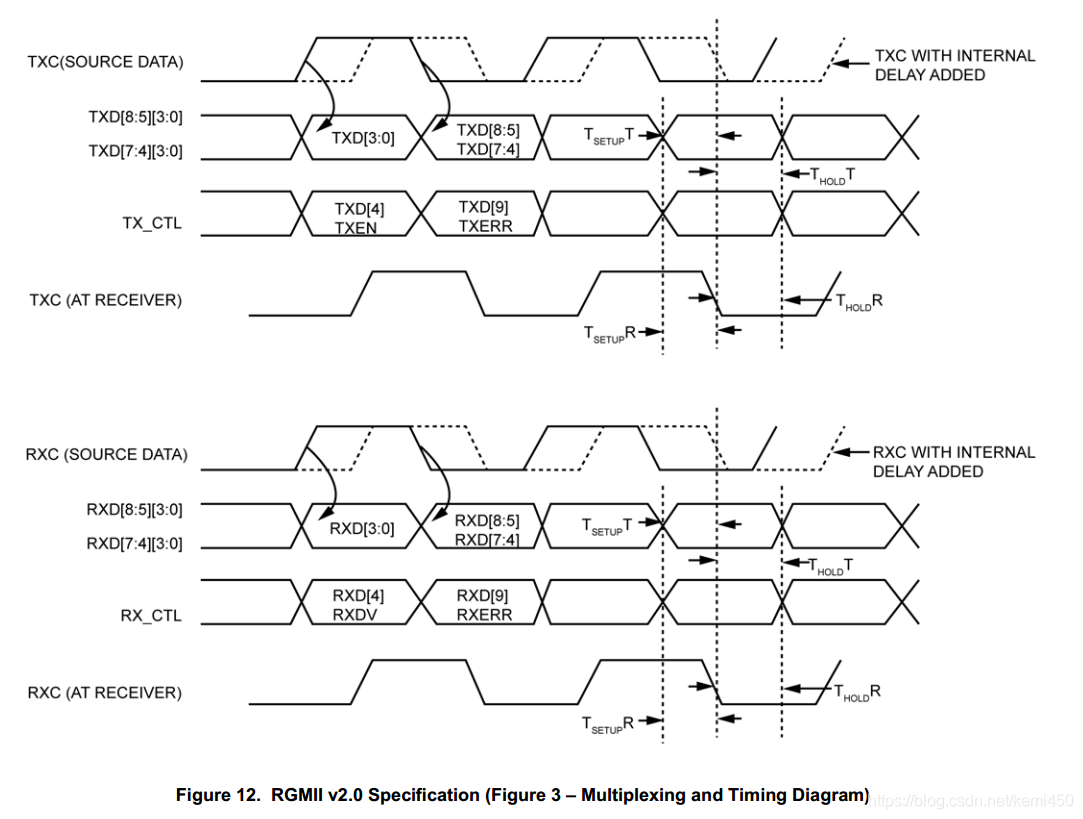Overview:
RGMII sequence is double edge sampling clock, RGMII in the default sequence, a clock (RXC / TXC) and the rim edge aligned data (TXD / RXD / TX_CTL / RX_CTL), and therefore, FPGA want to send and receive data correctly, the need for TXC or RXC appropriate delay. Since the highest clock is 125MHz, the optimal delay is 2ns.

Delayed design:
In the third speed network applications, the normal program needs 125MHz, 25MHz and 2.5MHz clock and the clock signal phase shifted by 90 °. And the PLL may not produce the 2.5MHz clock, the program clock number up to six, selector level 2 need not suitable timing constraints. Alternatively, the input clock is a delay, then the internal data processing delayed clock signal, the last clock signal delayed by a certain delay output, to ensure the application of such three-speed network, while a small number of clocks for timing analysis and constraints.
The Xilinx 7z020,7z030 in the series, there IDELAY2 ODELAY2 and accurate clock and data delay, can achieve three-rate applications. Use IDELAY2 and ODELAY2 need IDELAYCTRL a reference clock and 200MHz, and bound into one group. Its use is as follows:
// IDELAYCTRL is needed for calibration
(* IODELAY_GROUP = "rgmii_interface" *)
IDELAYCTRL idelayctrl_inst
(
.RDY ( ),
.REFCLK (ref_clock_bufg ),
.RST (idelay_reset )
);
//delay the output clock
defparam odelay2_inst.CINVCTRL_SEL = "FALSE" ;
defparam odelay2_inst.DELAY_SRC = "CLKIN" ;
defparam odelay2_inst.HIGH_PERFORMANCE_MODE = "FALSE" ;
defparam odelay2_inst.ODELAY_TYPE = "FIXED" ;
defparam odelay2_inst.ODELAY_VALUE = 25 ;
defparam odelay2_inst.PIPE_SEL = "FALSE" ;
defparam odelay2_inst.REFCLK_FREQUENCY = 200.0 ;
defparam odelay2_inst.SIGNAL_PATTERN = "CLOCK" ;
(* IODELAY_GROUP = "rgmii_interface" *)
ODELAYE2 odelay2_inst
(
.DATAOUT (clk_out_delay ),
.C (1'b0 ),
.CE (1'b0 ),
.INC (1'b0 ),
.ODATAIN (1'b0 ),
.LD (idelay_reset ),
.LDPIPEEN (1'b0 ),
.REGRST (1'b0 ),
.CLKIN (rgmii_clk ),
.CNTVALUEIN (5'b00000 ),
.CNTVALUEOUT ( ),
.CINVCTRL (1'b0 )
);
// delay the input clock
defparam idelay2_inst.CINVCTRL_SEL = "FALSE" ;
defparam idelay2_inst.DELAY_SRC = "IDATAIN" ;
defparam idelay2_inst.HIGH_PERFORMANCE_MODE = "FALSE" ;
defparam idelay2_inst.IDELAY_TYPE = "FIXED" ;
defparam idelay2_inst.IDELAY_VALUE = 25 ;
defparam idelay2_inst.REFCLK_FREQUENCY = 200.0 ;
defparam idelay2_inst.PIPE_SEL = "FALSE" ;
defparam idelay2_inst.SIGNAL_PATTERN = "CLOCK" ;
(* IODELAY_GROUP = "rgmii_interface" *)
IDELAYE2 idelay2_inst
(
.DATAOUT (clk_in_delay ), // Delayed clock
.DATAIN (1'b0 ), // Data from FPGA logic
.C (1'b0 ),
.CE (1'b0 ),
.INC (1'b0 ),
.IDATAIN (clk_in ),
.LD (idelay_reset ),
.LDPIPEEN (1'b0 ),
.REGRST (1'b0 ),
.CNTVALUEIN (5'b00000 ),
.CNTVALUEOUT ( ),
.CINVCTRL (1'b0 )
);Altera's Cyclone series can be achieved by IOE delay. In the Assignment Editor by Decrease Input Delay or the Increase Delay to Output Pin. Or other Delay.
Since part of the FPGA includes a delay adjustment is not fully functional, therefore, the interface can adjust the internal delay PHY achieve expected results by SMI. Wherein the delay data is a range of -0.42 ~ 0.48ns, the clock delay range is -0.9 ~ 0.96ns.
KSZ9031 the SMI interface program:
// ==============================================================
// RTL generated by Vivado(TM) HLS - High-Level Synthesis from C, C++ and SystemC
// Version: 2016.4
// Copyright (C) 1986-2016 Xilinx, Inc. All Rights Reserved.
//
// ===========================================================
`timescale 1 ns / 1 ps
module smi (
reset ,
sysclk ,
start ,//start
ack ,//ack
op_mode ,//1-read,0-write
phy_addr ,
reg_addr ,
write_data ,
read_data ,
read_data_val ,
done ,
mdc ,
mdi ,
mdo ,
mdoe
);
parameter N = 50_000_000 ;//分频因子,MDC时钟频率=时钟/N;
localparam Nmax = N-1 ;
localparam wd = Nmax>0 ? clogb2(Nmax) : 1;
input reset ;
input sysclk ;
input start ;
output ack ;
input op_mode ;
input [2:0] phy_addr ;
input [4:0] reg_addr ;
input [15:0] write_data ;
output [15:0] read_data ;
output read_data_val ;
output done ;
output mdc ;
input mdi ;
output mdo ;
output mdoe ;
reg [15:0] read_data ;
reg mdoe = 1'b0 ;
reg mdo ;
reg done ;
reg read_data_val ;
reg mdc ;
reg ack='b0 ;
wire mdi ;
reg [wd-1:0] sys_cnt ={wd{1'b0}} ;
reg clk_en ;
reg [31:0] data_reg ;
reg read_flag ;
reg [ 7:0] clk_cnt=8'd0 ;
//---0-----1-----2-----
//-start---x-----------
//--------ack----x-----
//clk_cnt[7]:1-work,0-idle
//clk_cnt[0]:mdc
//------------------------SMI timing-------------------------------
// preamble | sof | op | phy | reg | TA | data | IDLE
// 32x1 01 10 00aaa rrrrr z0 16*x z (read)
// 32x1 01 01 00aaa rrrrr 10 16*x z (write)
//-----------------------------------------------------------------
//preamble: 128<=clk_cnt<192,
//sof : 192<=clk_cnt<196,
//op_code : 196<=clk_cnt<200,
//phy addr: 200<=clk_cnt<210,
//reg addr: 210<=clk_cnt<220,
//TA : 220<=clk_cnt<224,
//data : 224<=clk_cnt<256,
//IDLE : 0 <=clk_cnt<127,
//分频产生目标MDC时钟频率
always @ ( posedge sysclk )
if(sys_cnt == Nmax)
sys_cnt <= {wd{1'b0}};
else
sys_cnt <= sys_cnt + 1;
always @ ( posedge sysclk )
clk_en <= sys_cnt == Nmax;
//握手信号,开始和应答
always @ ( posedge sysclk )
if(clk_en)
begin
if(clk_cnt==0)
begin
if(start)
clk_cnt <= 7'd1;
end
else
clk_cnt <= clk_cnt + 7'd1;
end
always @ ( posedge sysclk )
ack <= clk_en & (clk_cnt == 0) & start;
//MDC时钟信号
always @ ( posedge sysclk )
mdc <= clk_cnt[0] & clk_cnt[7];
//MDIO输出
always @ ( posedge sysclk )
if(clk_cnt[7]&&clk_cnt<=8'd191)
mdo <= 1'b1;
else
mdo <= data_reg[31];
//MDIO输出使能
always @ ( posedge sysclk )
if(read_flag)
mdoe <= (clk_cnt[7] && clk_cnt<=8'd219);
else
mdoe <= clk_cnt[7];
//MDIO输入
always @ ( posedge sysclk )
if(!mdoe & clk_cnt[0] & clk_en)
read_data <= {read_data,mdi};
//MDIO输入数据完成
always @ ( posedge sysclk )
read_data_val <= (clk_en&read_flag)&(clk_cnt==8'd254);
//传输完成
always @ ( posedge sysclk )
done <= clk_en & (clk_cnt==8'd255);
//输出移位寄存器
always @ ( posedge sysclk )
if(clk_en)
begin
if(clk_cnt==0)
begin
if(start)
begin
data_reg <= {2'b01,op_mode,!op_mode,
2'b00,phy_addr,reg_addr,
2'b10,write_data};
read_flag <= op_mode;
end
end
else if((clk_cnt[7:6]==2'b11)&clk_cnt[0])
data_reg <= {data_reg,1'b0};
end
//求log2(xin)
function integer clogb2;
input integer depth;
for (clogb2=0; depth>0; clogb2=clogb2+1)
depth = depth >> 1;
endfunction
endmodule //smi